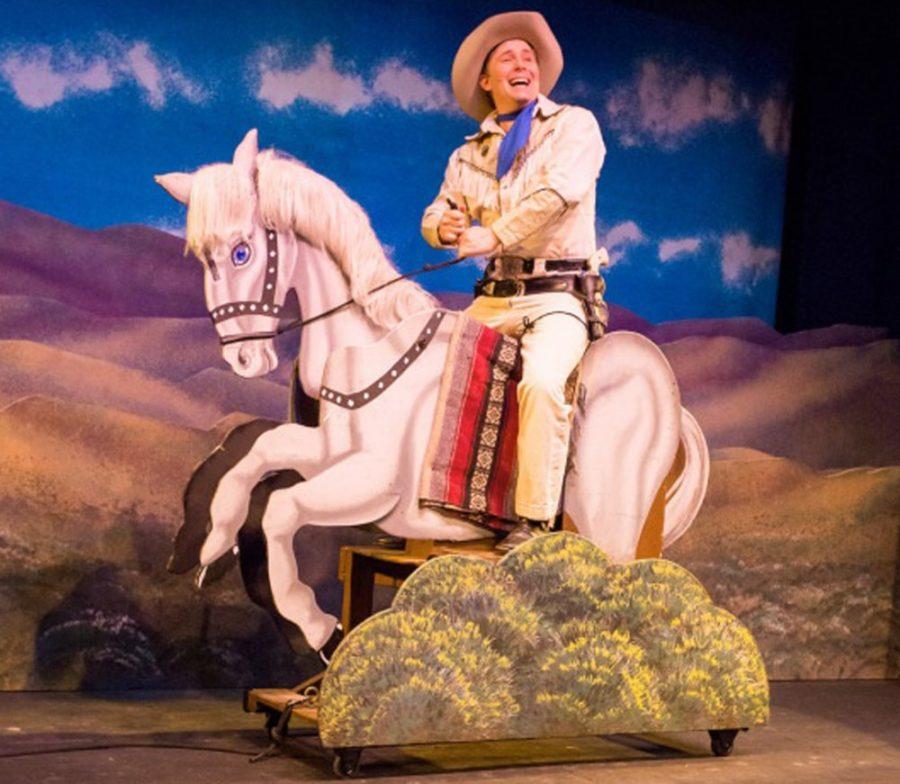The saloon exterior of The Gaslight Theatre, which has seen 37 seasons of performances, lends itself well to the original production of “The Ballad of Two-Gun McGraw.” The boot-leather smell in the auditorium entrance might be from wear and tear, but it suits the Wild West ambiance.
This self-aware musical parody, written and directed by Peter Van Slyke in his over 100th production for The Gaslight Theatre, is steeped in pop culture and familiar western stock characters.
The musical melodrama parodies western comedy hijinks of the 1950s and ’60s like Cat Ballou, Gunsmoke and Support Your Local Sheriff.
Unlike Cat Ballou, the female leads were underutilized, used like props to signal the end of a scene and swoon over men, and they lacked character background.
Slyke admitted his frustration with trying to provide the female cast more action, but the nature of the western genre and the generic roles written for women in western cinema limited his parody options.
Delilah, the “proprietress” of the local saloon, shares a similar likeness to “Gunsmoke”’s Miss Kitty with her red wig updo.
Heather Stricker’s Delilah shines in her entirely unaddressed reason for singing “Lovesick Blues”; however, her powerhouse vocals forgive this oversight.
Texas Ranger Two-Gun McGraw providentially arrives in town just as Miss Melody requires gentlemanly assistance in saving her ranch from villain Jack Dagger.
Miss Melody’s feminine floral prints and innocence appeal to McGraw’s need to protect the decent folks of Texas.
McGraw’s white 10-gallon hat, white cowboy suit trimmed in silver fringe complete with an impractical dainty blue scarf give Mike Yarema’s Two-Gun McGraw the trustworthy appeal of Roy Rogers.
Armen Dirtadian uses his scruffy Lee Marvin-esque voice to supply villain Jack Dagger with authoritative menace. Dagger hires two desperados to aid in his attempt to rob whatever he can get his hands on.
Laredo, a barrel-chested rakish man who is his own biggest fan, repeatedly pops his hip toward the audience asking, “What’s my name, again?” to the sound of a cracking whip.
To Laredo’s delight, the audience hollers his name.
Jacob Brown’s Red Dog entered the stage with flare and glee, shooting his pistol in time with whizzing bullet sound effects and howling like Ernest T. Bass catching sight of a pretty girl. Brown’s comic relief character could be obnoxious in less capable hands, but not even riffing Ennio Morricone’s spaghetti western theme turned the audience against him.
Eschewing War Horse mechanics, the prop horses have visible wheels and suspenders attached to the actors to purposely incite the audience to mock any displays of machismo in the villains.
The theater’s waitresses wore similar black back-laced saloon girl corsets with a feather in their hair, immersing the audience with the onstage saloon as they delivered complementary popcorn.
Scenes feature rapid dialogue and quick one-liners, and a succession of simple musical numbers signal the end of scenes.
The pacing would be greatly hindered without the aid of the stage left trio of musicians able to add accompaniment when the actors improvise.
Linda Ackermann’s 92nd consecutive musical direction, ability to improvise on the piano with the actors and singing before the show and during intermission were superb.
Ackermann’s intermission rendition of “Sin Wagon” kept the energy alive as she played the piano with the fevered rhythm of Jerry Lee Lewis.
Becky Gilmour, The Gaslight Theatre’s general manager, said the theater was created by UA alumni and employs former and current UA students in the crew and cast repertory.
“The Ballad of Two-Gun McGraw” is a sentimental and humorous parody of beloved westerns. The humor is quick, clean and without overt wholesomeness. The show is followed with the ensemble performing a “Beverly Hillbillies” variety show with plenty of well-known country songs.
The play performs daily with three performances on weekends until March 29.
_______________
Follow Anna Mae Ludlum on Twitter.









